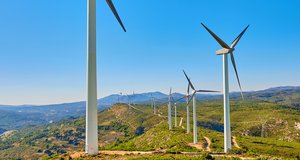Renewable Energy & Human Rights Benchmark 2023

Shutterstock (licensed)

Shutterstock (licensed)
Climate change is the biggest risk to human rights. Meeting its challenge requires unprecedented roll-out of renewable energy projects across all regions in the coming years and decades. This transformation offers immense opportunity for the private sector and governments, as well as for the communities and workers upon whose support the global energy transition depends. However, the speed and scope of the energy transition also comes with risk of real harm that also hollows out public trust, as threats to environment, livelihoods, land, Indigenous Peoples’ rights and culture, and labour rights are already emerging.
This third edition of the Renewable Energy & Human Rights Benchmark sheds light on the human rights policies and practices of 28 companies in the renewable energy value chain – from equipment manufacturers to developers.
Key findings
- Eight companies, both manufacturers and project developers, now have in place policies specifically to respect the rights of human rights and environmental defenders, showing progress of the sector at policy level in a critical area.
- The highest scores in each company category are low: 34% in the electric utilities category, 21% for Independent Power producers, 30% for oil and gas firms, and 39% for manufacturers, demonstrating a need for significant improvement in human rights commitment and practice across the sector as a whole.
- Policies and practices on Indigenous Peoples’ rights and land rights remain poor, despite these rights being the subject of the highest number of serious allegations. Only two companies (Ørsted and ACCIONA Energía) have a commitment to respect land rights, while two companies (Ørsted and EDF Renewables) have clear policy commitments to respect Indigenous Peoples’ rights, including their right to Free, Prior and Informed Consent.
- No project developer has made a public commitment at policy level to identify potential benefit and ownership sharing agreements with local communities.
- The severe issue of exposure to forced labour risks in Xinjiang Autonomous Uyghur Region (XUAR), as documented by UN bodies, requires urgent transparency of solar supply chains. No company in the Benchmark currently publicly discloses its full solar panel supply chain.
- Solar panel manufacturers lag significantly on human rights commitments and practices compared with wind. Only two out of six solar manufacturers (First Solar and Trina Solar) had a strong human rights commitment in place.
- The single biggest human rights issue for oil and gas sector companies (bp, Shell, and TotalEnergies) involved in renewable energy projects remains their lack of a credible transition plan aligned towards meeting 1.5°C ambitions.
Scoring approach
- The Renewable Energy & Human Rights Benchmark ranks 28 key publicly traded companies in the wind and solar sector. See the methodology for more information on the scope of companies included in the benchmark.
- Scores for companies in the different project developers’ sub-categories (electric utilities, oil and gas, independent power producers) should not be compared to one another as company assessment categories have been designed to allow for integration of an assessment of efforts towards full decarbonisation of energy production portfolio for electric utilities and oil and gas companies, based on the World Benchmarking Alliance’s Oil & Gas and Electric Utilities Benchmark, using ACT methodologies.
- Scores for equipment (wind turbines and solar panels) manufacturers should not be compared to project developers’ scores as indicators have been tailored to reflect their position in renewable energy value chains.
- Brookfield Renewable Partners and Enel Green Power shared additional information relevant to the benchmark after the cut-off dates that can be accessed on their company pages.
Click on a company name in the charts above or explore companies' pages to access individual scorecards
Recommendations
The Benchmark contains specific recommendations to companies, governments and policy-makers and investors in relation to:
- Shared prosperity and the rights of Indigenous People, including to Free, Prior and Informed Consent
- Corporate and investors duty of care, including due diligence for human and labour rights, risks of forced labour, and the rights of Indigenous People and Human Rights Defenders
- Fair negotiations with workers, Indigenous People and communities
- Responsible lobbying
- Low-carbon planning
See the Key Findings Report for our comprehensive recommendations.
Download scoring data
Take a look at the summary of results
Just energy transition principles for human rights in business and investment
Core principles for a just energy transition
Further reading
Focus on risk of exposure to forced labour in XUAR
Explore companies' answers
Briefing annex
Take a look at our in-depth assessment of how companies performed under the core UNGPs indicators section
2023 World Benchmarking Alliance Electric Utilities Benchmark
Take a look at in-depths assessments of Electric Utilities companies progress towards a Just Transition by the World Benchmarking Alliance
2021 Benchmark
See how companies scored in the 2021 Renewable Energy & Human Rights Benchmark